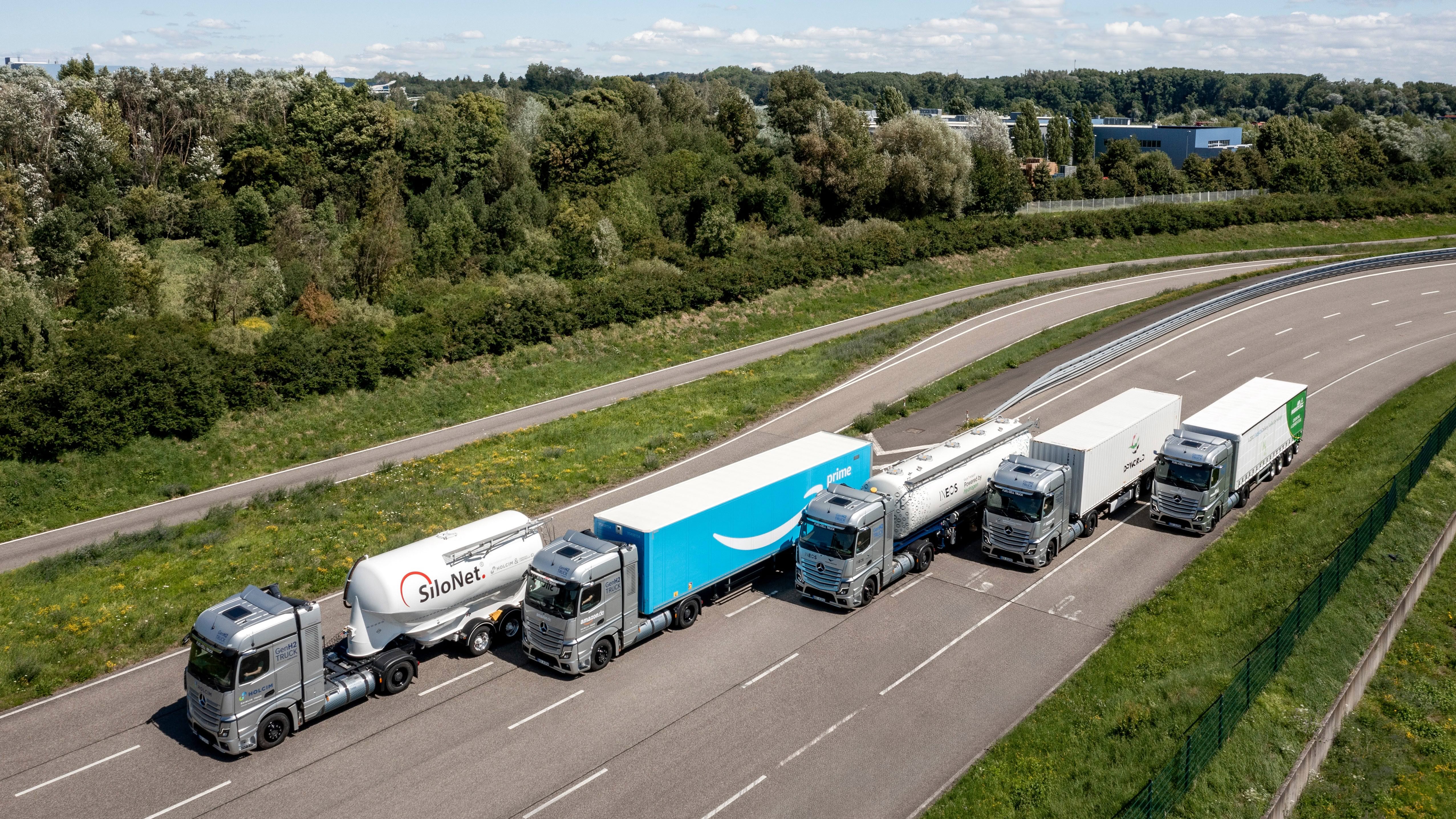Customer trials of Mercedes-Benz GenH2 trucks begin

Daimler Truck has begun initial customer trials with five Mercedes-Benz GenH2 trucks, with customers Air Products, Amazon, Holcim, INEOS and Wiedmann & Winz.
The trials, which follow a rigorous testing phase on the test track and public road, look to gain practical experience with fuel cell trucks at an early stage during a test phase of around one year.
Through the collaboration, the Daimler Truck development team will acquire insights into the real-life operations of trucks powered by liquid hydrogen, and learn about specific customer requirements that can be taken into account for series development.
Daimler Truck’s objective is to offer only new vehicles that are CO2-neutral in driving operation across its global core markets (EU30, USA, Japan) by 2039. Hydrogen-based drive technologies can thereby be an optimal solution, especially for very flexible and particularly demanding applications in heavy-duty and long-distance haulage.
The five GenH2 Trucks will be deployed in different long-haul applications on specific routes in Germany, such as the transport of building materials, sea containers or cylinder gases. The trucks will be refueled at the designated liquid hydrogen filling stations (sLH2) in Woerth am Rhein and in future also in the Duisburg area.
“When it comes to decarbonising transport, we are focusing on battery-electric and hydrogen-based drives,” said Martin Daum, chairman of the board of management of Daimler Truck.
“The transformation can only succeed if green energy is sufficiently and comprehensively available – and for this we need both technologies.
“With regard to hydrogen drives, we are now taking another important step towards series readiness: we are starting the trials of our Mercedes-Benz GenH2 Trucks in real-life daily transport operations with our customers,” he said.
“However, it is important to note that high-performance CO2-neutral vehicles alone will not be enough to make sustainable transportation successful. This also requires a corresponding charging and refueling infrastructure, as well as cost parity with conventional vehicles. Although policymakers and energy companies are already active here, we urgently need even more momentum, across all of Europe.”
The five semi-trailer tractors will be used by customers in various long-haul applications throughout the trial period. Amazon will use the GenH2 Truck in its logistics operations in Germany, Air Products for the transport of cylinder gases, Wiedmann & Winz for sea containers, Holcim for building materials logistics, and VERVAEKE – the logistics company of INEOS – for PVC and vinyl transportation.

The development engineers of Daimler Truck have based the GenH2 truck on the characteristics of the conventional Mercedes-Benz Actros long-haul truck in terms of payload, range and performance. The Mercedes-Benz GenH2 trucks, which are used in these first customer trials, offer a payload of approx. 25 tons at a gross combination weight (GCW) of 40 tons. Two special liquid hydrogen tanks and a powerful fuel-cell system by cellcentric, the Joint Venture of Daimler Truck and Volvo Group, enable the high payload and long range. They represent the centerpiece of the GenH2 truck.
The fuel-cell system of the GenH2 Truck delivers 300 kilowatts (2 x150kW) and the battery provides an additional 400 kW temporarily. At 70kWh, the storage capacity of the battery is relatively low, as it is not intended to meet energy needs, but mainly to be switched on to provide situational power support for the fuel cell, for example during peak loads while accelerating or while driving uphill fully loaded. At the same time, the relatively light battery allows a higher payload.
It is recharged with braking energy and excess fuel-cell energy. A core element of the sophisticated operating strategy of the fuel-cell and battery system is a cooling and heating system that keeps all components at a suitable operating temperature, thus ensuring maximum durability. In a pre-series version, the two electric motors are designed for a total of 2 x 230kW continuous power and 2 x 330kW maximum power. The GenH2 Truck thereby delivers a torque of 2 x 1577Nm or 2 x 2071Nm.
The two stainless-steel liquid-hydrogen tanks of the GenH2 Truck have a particularly high storage capacity of 88kg (44kg each), perfectly suited for covering long distances. The stainless-steel tank system consists of two tubes, one within the other, that are vacuum isolated and connected to each other.
Liquid hydrogen enables a range of 1000km and more
Daimler Truck prefers liquid hydrogen in the development of hydrogen-based drives. In this aggregate state the energy carrier has a significantly higher energy density. As a result, more hydrogen can be carried, which significantly increases the range and enables comparable performance of the vehicle with that of a conventional diesel truck. Transportation efforts can be significantly reduced with liquid hydrogen, and liquid hydrogen tanks also offer advantages in terms of cost and weight compared to compressed gaseous hydrogen. Thus, the use of liquid hydrogen enables a higher payload. This makes the Mercedes-Benz GenH2 truck just as suitable for flexible and demanding long-haul road transportation as conventional diesel trucks.
In September 2023, Daimler Truck successfully demonstrated this when a public road approved prototype of the Mercedes-Benz GenH2 Truck completed the #HydrogenRecordRun, covering 1047 km with one tank filling of liquid hydrogen on board.





